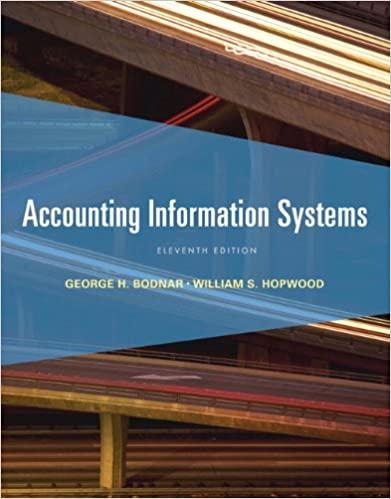1. Employers bond employees who handle cash receipts because fidelity bonds reduce the possibility of employing dishonest...
Question:
a. Protect employees who make unintentional errors from possible monetary damages resulting from their errors.
b. Deter dishonesty by making employees aware that insurance companies may investigate and prosecute dishonest acts.
c. Facilitate an independent monitoring of the receiving and depositing of cash receipts.
d. Force employees in positions of trust to take periodic vacations and rotate their assigned duties.
2. Proper segregation of functional responsibilities calls for separation of the
a. Authorization, approval, and execution functions.
b. Authorization, execution, and payment functions.
c. Receiving, shipping, and custodial functions.
d. Authorization, recording, and custodial functions
3. A company holds bearer bonds as a short- term investment. Custody of these bonds and submission of coupons for interest payments normally is the responsibility of the
a. Treasury function.
b. Legal counsel.
c. General accounting function.
d. Internal audit function.
4. Operating control of the check- signing machine normally should be the responsibility of the
a. General accounting function.
b. Treasury function.
c. Legal counsel.
d. Internal audit function
5. Internal control over cash receipts is weakened when an employee who receives customer mail receipts also
a. Prepares initial cash receipts records.
b. Records credits to individual accounts receivable.
c. Prepares bank deposit slips for all mail receipts.
d. Maintains a petty cash fund.
6. For good internal control, the monthly bank statements should be reconciled by someone under the direction of the
a. Credit manager.
b. Controller.
c. Cashier
d. Treasurer.
7. For good internal control, the person who should sign checks is the
a. Person preparing the checks.
b. Purchasing agent.
c. Accounts payable clerk.
d. Treasurer.
8. For good internal control, the credit manager should be responsible to the
a. Sales Manager.
b. Customer service manager.
c. Controller.
d. Treasurer.
9. The authorization for write- off of accounts receivable should be the responsibility of the
a. Credit manager.
b. Controller.
c. Accounts receivable clerk.
d. Treasurer.
10. In general, material irregularities perpetrated by which of the following are most difficult to detect?
a. Cashier
b. Controller
c. Internal auditor
d. Data entry clerk
Accounts Payable
Accounts payable (AP) are bills to be paid as part of the normal course of business.This is a standard accounting term, one of the most common liabilities, which normally appears in the balance sheet listing of liabilities. Businesses receive... Accounts Receivable
Accounts receivables are debts owed to your company, usually from sales on credit. Accounts receivable is business asset, the sum of the money owed to you by customers who haven’t paid.The standard procedure in business-to-business sales is that...
Fantastic news! We've Found the answer you've been seeking!
Step by Step Answer:
Related Book For 

Accounting Information Systems
ISBN: 9780132871938
11th Edition
Authors: George H. Bodnar, William S. Hopwood
Question Posted:





